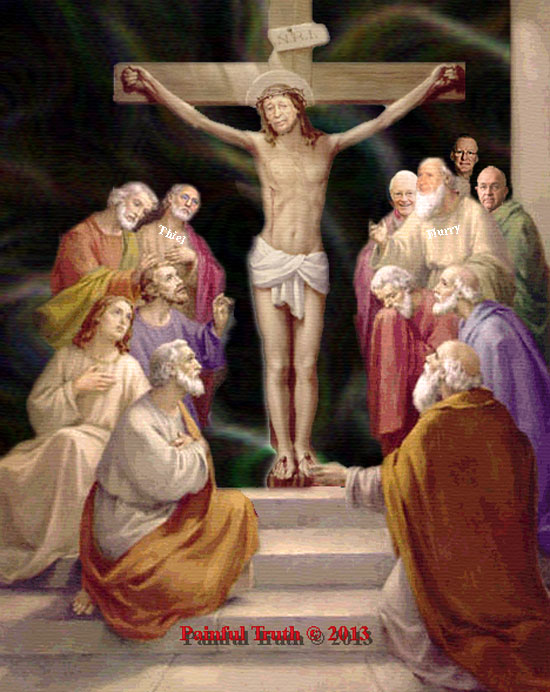
Blast from the past…
Go ye therefore, and teach all nations, baptizing them in the name of the Father, and of the Son, and of the Holy Ghost: Teaching them to observe all things whatsoever I have commanded you: and, lo, I am with you always, even unto the end of the world. Amen. (Matt. 28:19-20)
And he said unto them, Go ye into all the world, and preach the gospel to every creature (Mark 16:15 )
Just like Islam, one of the main tenets of Christianity is evangelism. Spreading the gospel is supposed to be the primary purpose of the Christian believer. After all, once you have been “saved”, you want to share that salvation with others. Any other course of action would be selfish and ungrateful.
But being a missionary in the 21st Century has become a hazardous occupation. Over the past handful of years, in various countries, missionaries have been kidnapped, murdered, shot down, and blown up by enemies of their faith. The overwhelming majority of the survivors of these incidents, however, feel justified in continuing their mission. No one ever said it would be easy, they point out, and being martyred for their faith is actually praised in the Bible.
What’s the Point?
But when I stand back and look at the whole picture, I have to ask myself — is there any point to all this? After all, missionaries have been going into harm’s way for centuries, suffering persecution of all kinds, and Jesus still hasn’t come back.
When you stop and think about it, the world is a pretty big place. At last count there were something like 6 billion human beings, with millions dying and being born every day. A population in a state of flux. If you take the Bible literally, you have to ask yourself: Is it even possible to carry out the commission of Mark 16? Assuming you could even reach (and be understood by) “every creature” — by the time you got done, there would be millions who had been born since you passed their way. You’d have to start around again.
Wouldn’t you?
That logic hasn’t stopped thousands of Christians from trying. Ignoring for the moment the televangelists with their glittering jewelry and Grand Ole Opry haircuts, there are thousands of sincere, hard-working people out there every day in the plains of Africa, the jungles of the Amazon, and the vastness of China who are trying to spread the word. They’ve even made converts, and small Christian communities exist in many of these countries, new believers who also do their best to spread the gospel.
But when does it stop? When is enough enough? When do you know you’ve finished the job?
The answer, of course, would be that only God can know that, and when the job is done Jesus will return. You just gotta have faith.
Still, it seems kind of odd, doesn’t it? Jesus is supposed to have died for everybody, on all continents. So why is it that only the Western nations contain any measurable percentage of Christians? Why are the majority of Africans, Asians, Indians, and Arabs predominantly non-Christian? And why, among those nations with substantial Christian populations, do the lion’s share of missionaries come only from the United States ?
Based on demographics like those, it looks suspiciously as if the program isn’t working.
A Worldwide Work
For half a century, Herbert Armstrong told us that his mission in life was the spreading of the gospel. Not the gospel taught by everyone else, a gospel about Jesus, but the gospel Jesus himself taught. To that end he was on the radio or television every day, preaching the brand of gospel he believed God wanted him to share. He wrote millions of words in booklets and magazines, traveled to almost every country on the planet, and consorted with kings and prime ministers.
Outside the United States , Herbert Armstrong probably never spoke personally to more than a few dozen people, yet he and his organization made arrangements to beam radio and TV messages to hundreds of millions, distributed magazines and booklets to over a hundred countries. Hundreds of millions of dollars were spent on this endeavor, to fulfill the commission of Mark 16 and Matthew 28, because only then could Christ return to earth in power and glory.
Herbert Armstrong died 18 years ago. Before he died, he proclaimed that he had finished the job.
http://www.hoselton.net/religion/hwa/coworker/850104.htm
So where’s Jesus?
Why hasn’t he come back?
Why hasn’t the kingdom of God been established as Herbert and his evangelists promised it would?
Splinter Works
It would seem there is a problem here. Herbert Armstrong spent 50 years trying to get the work done, and claimed to have finished the job. Supporting his efforts was a worldwide organization that, at its peak, collected $230 million per year, with a baptized membership of over 100 thousand people, with three college campuses on two continents, with foreign offices on six continents, hundreds of local congregations around the globe, and at least two jet aircraft capable of international flight.
Yet most of the world has never heard of Herbert Armstrong (or his Worldwide Church of God), most of the world still isn’t Christian, and Jesus still hasn’t come back. After 18 years. So one might logically conclude that Armstrong was wrong when he said he had finished spreading the gospel. With all those resources and all those dollars, even God’s “end-time apostle” was unable to get the job done.
Which brings me to the main point of this article: if Herbert Armstrong couldn’t do it, with all that money, all those resources, and all those years…how in the world do the splinter churches think they are going to succeed?
I haven’t even tried to keep up with all the splinter groups that have spun off from the collapse of WCG; the last count I heard was well over a hundred, collectively comprised of perhaps 50% of the original WCG membership. Each and every one of these groups apparently thinks that only it is carrying on in Herbert’s footsteps. The largest of these groups probably numbers under 5000 members, scattered across how many continents, each struggling to put out some kind of publication, a few booklets, maybe a radio or TV program on half a dozen stations. Each one is in competition with all the others, some even suing others over the publication rights to Herbert’s writings.
And then, every year or so, one of those groups will self-destruct and splinter into even smaller congregations. Some have fragmented down to as few as 50-100 members, yet they boldly declare that they are “carrying on” to get the gospel out.
Is anything wrong with this picture? Doesn’t this seem like an exercise in futility?
A Grain of Mustard Seed
I’m sure that, if asked, many members of these numerous and microscopic churches would reply that “size doesn’t matter”, that with “faith the size of a mustard seed”, God is capable of multiplying the work until it fills the earth.
Sort of sounds biblical, doesn’t it? But the fact is that most of these groups are about the same size that Armstrong’s church was back in the 1930s. And they’re collecting just about the same amount of money (adjusted for inflation, perhaps even less). But why would God go through the same exercise all over again? After all, most of these groups revere Herbert Armstrong as God’s apostle; God already (supposedly) multiplied Herbert’s work until it became a worldwide work. Yet that work didn’t get the job done, or we wouldn’t still be here trying to figure out how to preach the gospel to every creature.
So…that leaves just about two possibilities.
1) Herbert Armstrong never was an apostle of God, God never had anything to do with Herbert’s work, and Herbert was merely milking his membership for money so he and a few trusted lieutenants could live the good life while those who financed him were bled until they were destitute.
Or,
2) Those now running the splinter groups are doing exactly the same thing, using the Great Commission of Mark 16 and Matthew 28 to extort as much money from as few members as possible, because in reality they are all company men who have been part of an extortion ring for so long that they are too old to get real jobs, which would not pay for their extravagant lifestyles anyway.
A third possibility might be that both 1) and 2) are true.
If you are a member of one of the “new and improved” churches of God, perhaps it’s time to take a step back and reevaluate. Could you possibly have been misled? Is it even logical that your particular group, tiny as it is, can get the gospel message out before your particular leader dies?
Or is it possible, just maybe, that the original 12 apostles (the real apostles), already did that?
Then the disciples went out and preached everywhere, and the Lord worked with them and confirmed his word by the signs that accompanied it. (Mark 16:20 )
10/26/2006
